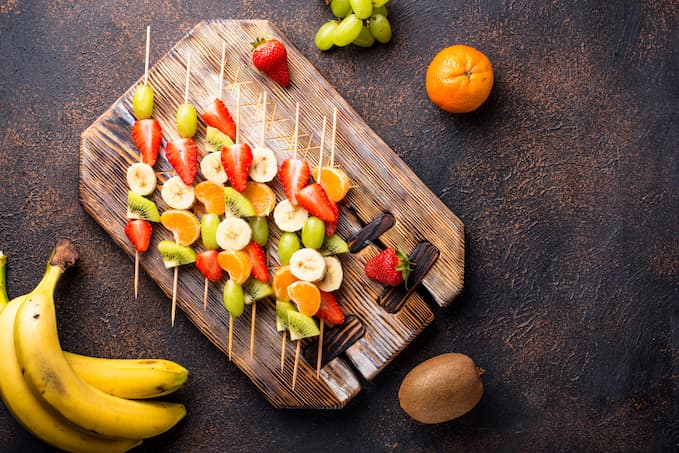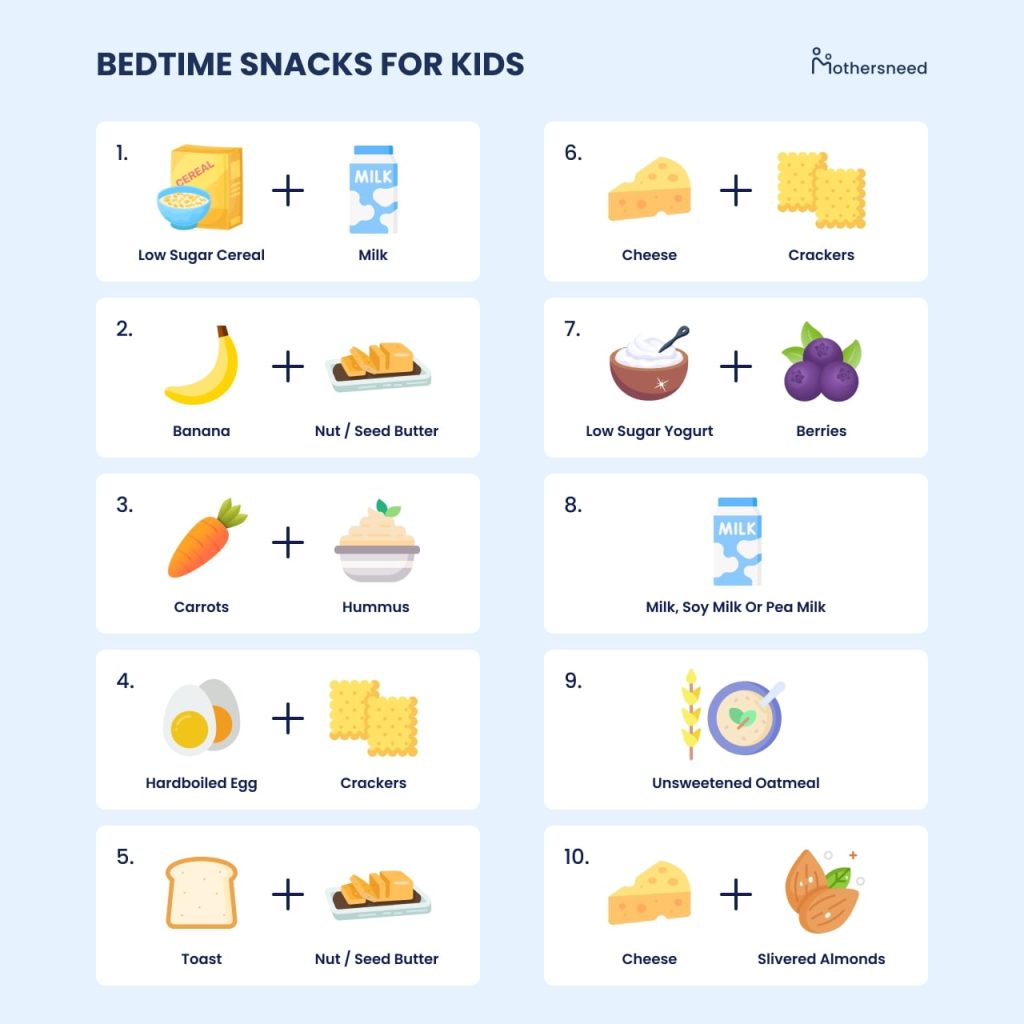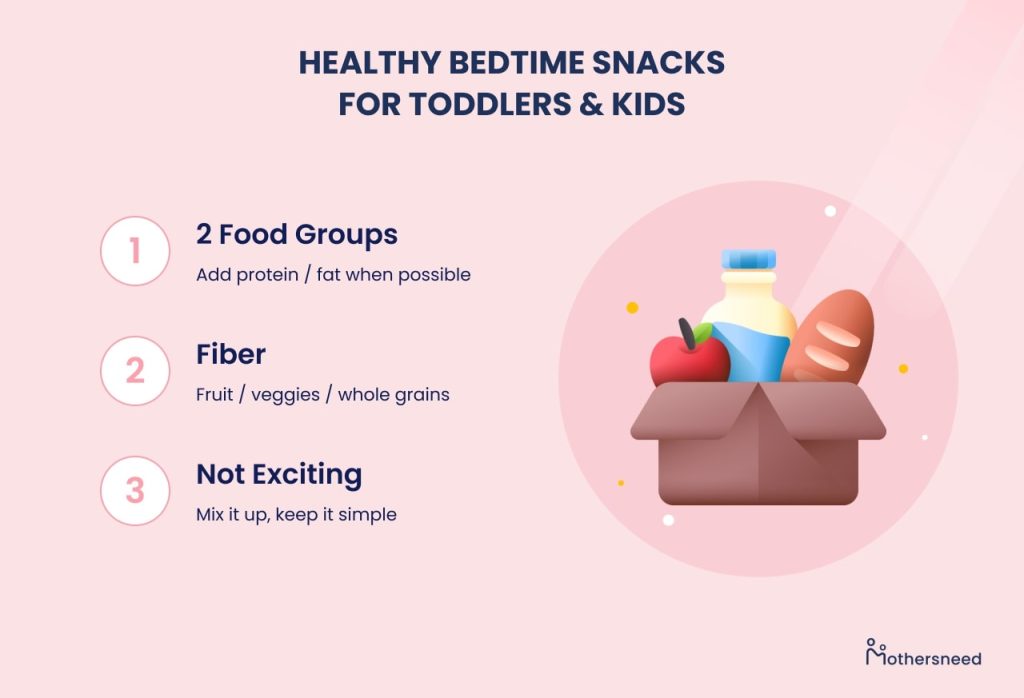
Bedtime snacks can be a tricky topic for parents. On the one hand, you don’t want to give your child anything too heavy or sugary that might keep them up all night. On the other hand, you don’t want them going to bed hungry and waking up in the middle of the night looking for a snack. So what are the best options for some healthy bedtime snack ideas and snacks for kids?
According to experts, the key is to choose snacks that are light, easy to digest, and contain a combination of carbohydrates and protein. This will help keep your child feeling full and satisfied throughout the night without disrupting their sleep. Some great options include a small bowl of cereal with milk, a slice of whole grain toast with peanut butter, or a handful of nuts and dried fruit. Of course, every child is different, so it’s important to pay attention to how your child responds to different snacks and adjust snack routine accordingly.
Understanding Bedtime Snacks for Kids
Bedtime snacks for kids are a common practice in many households. Parents often worry about their children going to bed hungry, but it’s important to choose healthy options that won’t interfere with their sleep. Here are some things to keep in mind when considering the best bedtime snacks for kids:
Timing
It’s important to give your child enough time to digest their food before going to bed. A good rule of thumb is to offer a snack at least an hour before bedtime.
Portion size
Keep the portion size small, as a large snack can interfere with your child’s sleep. A small, healthy snack is all that’s needed to satisfy their hunger.
Healthy options
Choose snacks that are low in sugar and high in nutrients. Some healthy bedtime snack options include:
- A small bowl of whole-grain cereal with milk
- A piece of fruit, such as an apple or banana
- A handful of nuts or seeds
- A small serving of yogurt
- A few whole-grain crackers with cheese
Avoid Sugary snacks
Sugary snacks can cause a spike in blood sugar, which can interfere with your child’s sleep. Avoid sugary snacks like candy and chocolate.
Encourage healthy habits
Bedtime snacks can be a great opportunity to encourage healthy habits. Involve your child in choosing and preparing their snack, and make it a part of your bedtime routine.
Overall, bedtime snacks for kids can be a healthy and satisfying way to ensure that your child goes to bed feeling full and satisfied. By choosing healthy options and keeping portion and simple snack sizes small, you can help your child establish healthy habits that will benefit them for years to come.
The Importance of Nutrition in Bedtime Snacks
Nutrition is essential for overall health and well-being, and it is especially important for growing children. Providing children with healthy bedtime snacks can help meet their nutritional needs and promote better sleep.
Protein is an important nutrient for growing children, as it helps build and repair tissues. A bedtime snack that includes protein, such as a slice of cheese or a cup of yogurt, can help keep children feeling full throughout the night.
Fat is another important nutrient that children need for healthy growth and development. Including healthy fats, such as those found in nuts or avocado, in bedtime snacks can help provide children with the energy they need to sleep soundly through the night.
Vitamins and minerals are also essential for children’s growth and development. Including fruits and vegetables in bedtime snacks can help ensure that children are getting the vitamins and minerals they need, such as vitamin C, magnesium, calcium, and potassium.
Carbohydrates are a great source of energy for children, but it is important to choose complex carbohydrates, such as whole grains, rather than simple carbohydrates, such as candy or sugary snacks. Complex carbohydrates provide sustained energy and can help children feel full throughout the night.
Fiber is another important nutrient that can help children feel full and satisfied. Including high-fiber foods, such as whole grain crackers or sliced apples, in bedtime snacks can help promote better sleep and help children wake up feeling energized.
Finally, serotonin is a neurotransmitter that plays a role in regulating sleep. Including foods that contain tryptophan, an amino acid that is a precursor to serotonin, in bedtime snacks can help promote better sleep. Foods rich in tryptophan include dairy products, nuts, and seeds.
Overall, providing children with healthy bedtime snacks that are rich in protein, healthy fats, vitamins, and minerals can help promote better sleep and support their overall health and well-being.
Healthy Bedtime Snack Options
When it comes to choosing a healthy bedtime snack for kids, there are plenty of options to consider. The key is to choose snacks that are low in sugar and high in nutrients, helping kids feel full and satisfied without disrupting their sleep.

Some great options to consider include:
- Milk and nut butter: A glass of milk paired with a tablespoon of nut butter (such as almond or peanut butter) is a great source of protein and healthy fats, helping kids feel full and satisfied.
- Cheese and fruit: A small serving of cheese (such as a cheese stick or a few cubes) paired with a serving of fresh fruit (such as apple slices or berries) is a great combination of protein, fiber, and vitamins.
- Yogurt and crackers: A serving of Greek yogurt paired with a few whole-grain crackers is a great source of protein and carbohydrates, helping kids feel full and satisfied.
- Toast with honey: A slice of whole-grain toast topped with a drizzle of honey is a sweet and satisfying snack that also provides a source of carbohydrates.
- Boiled egg and veggies: A hard-boiled egg paired with a serving of fresh veggies (such as carrot sticks or cucumber slices) is a great source of protein and fiber.
- Hummus and whole grain crackers: A serving of hummus paired with a few whole grain crackers is a great source of protein and fiber, helping kids feel full and satisfied.
- Homemade granola bars: Homemade granola bars made with whole grains, nuts, and dried fruit are a great snack option that can be customized to suit your child’s tastes.
By choosing healthy bedtime snacks that are high in nutrients and low in sugar, parents can help their kids feel full and satisfied without disrupting their sleep.
Avoiding Unhealthy Bedtime Snacks

When it comes to bedtime snacks for kids, it’s important to choose options that are both satisfying and nutritious. However, many popular easy bedtime snacks are loaded with sugar and other unhealthy ingredients that can disrupt sleep and contribute to weight gain. Here are some tips for avoiding unhealthy bedtime snacks:
- Avoid sugary snacks: Sugary snacks like candy, cookies, and soda can cause blood sugar spikes and crashes, making it difficult for kids to fall asleep and stay asleep. Instead, opt for snacks that are naturally sweet, like fresh fruit or dried fruit, without added sugar.
- Watch out for added sugar: Even snacks that seem healthy, like yogurt and granola bars, can be loaded with added sugar. Always check the label and choose snacks with little or no added sugar.
- Choose whole foods: Packaged snacks like chips and crackers are often high in salt and unhealthy fats. Instead, choose whole foods like vegetables with hummus or guacamole, popcorn, or nuts.
- Keep portions in check: Even healthy snacks can be unhealthy if consumed in large quantities. Keep portions small and avoid eating too close to bedtime to prevent discomfort and indigestion.
By following these tips, parents can ensure that their kids are getting the nutrition they need without sacrificing sleep or health.
How to Encourage Healthy Snacking Habits in Kids

Encouraging healthy snacking habits in kids can be a challenge, especially if they are picky eaters. However, it is important to ensure that kids eat their bedtime snacks are nutritious and won’t disrupt their sleep. Here are some tips to help parents encourage healthy snacking habits in kids:
- Make sure they have a balanced dinner: If kids have a balanced dinner, they are less likely to be hungry before bedtime and will be less likely to reach for unhealthy snacks. Make sure their dinner includes a variety of food groups, such as protein, whole grains, and vegetables.
- Offer healthy snacks: Keep a variety of healthy snacks on hand, such as cut-up vegetables, fruit, and nut butters. These snacks are not only nutritious but also delicious.
- Avoid sugary snacks: Sugary snacks can disrupt sleep and lead to nightmares. Instead, offer snacks that are low in sugar, such as an applesauce pouch or cucumber slices.
- Get them involved: Encourage kids to help prepare their own bedtime snacks. This can help them feel more invested in their food choices and make them more likely to choose healthy options.
- Use the oven: Roasting vegetables in the oven can make them more appealing to kids. Try roasting sweet potato or carrot sticks with a little olive oil and salt.
Consulting a Registered Dietitian
It is always advisable to consult a registered dietitian when it comes to planning your child’s meals, including bedtime snacks. A registered dietitian is a qualified professional who can provide expert advice on nutrition and help create a personalized meal plan for your child.
A registered dietitian can help ensure that your child’s bedtime snack is nutritious and provides the necessary nutrients to support growth and development. They can also help identify any nutrient deficiencies or excesses in your child’s diet and recommend appropriate changes.
When consulting a registered dietitian, it is important to provide them with information about your child’s medical history, dietary preferences, and any food allergies or intolerances. This will help the dietitian create a personalized meal plan that meets your child’s unique nutritional needs.
In addition to providing nutritional advice, a registered dietitian can also help with meal planning, grocery shopping, and food preparation. They can give snack ideas and provide tips on how to make healthy and delicious snacks that your child will enjoy.
Conclusion
In summary, bedtime snacks can be a great way to help kids get a good night’s sleep. However, it’s important to choose the right types of snacks that are both healthy and satisfying.
Foods that are high in sugar or caffeine should be avoided, as they can disrupt sleep and cause restlessness. Instead, opt for snacks that are high in protein and fiber, such as nuts, seeds, and whole grains. These foods can help keep kids feeling full throughout the night while also providing important nutrients that support healthy growth and development.
It’s also important to consider portion sizes when serving bedtime snacks. Too much food can lead to indigestion or discomfort, which can make it harder for kids to fall asleep. A small, satisfying, one bedtime snack, is often all that’s needed to keep hunger at bay and promote a restful night’s sleep.








